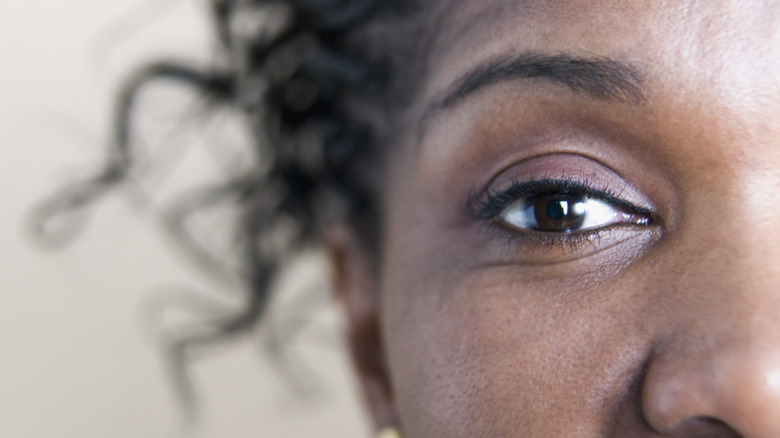Depression Has An Unexpected Effect On Your Vision
People living with depression know it's not just a bad mood. The brain changes associated with depression can make you more susceptible to pain and less interested in sex, according to Advanced Psychiatry Associates. Depression can also result in weight gain, which can lead to other chronic conditions such as high blood pressure, type 2 diabetes, and coronary artery disease. Insomnia is another symptom of depression that can keep people from activities that could improve their condition.
Because depression affects your immune system, it's linked to chronic inflammation. People with depression might also experience irritable bowel syndrome (IBS) and other gastrointestinal disorders (per Medical News Today). Your brain can also change with depression, affecting areas that involve learning, memory, emotions, and planning. Certain proteins in the brains of people with depression are linked to brain inflammation (per WebMD). Changes in the brain as a result of depression can also affect how you process visual information, particularly contrast and color.
If you or someone you know needs help with mental health, please contact the Crisis Text Line by texting HOME to 741741, call the National Alliance on Mental Illness helpline at 1-800-950-NAMI (6264), or visit the National Institute of Mental Health website.
Visual processing changes with depression
A 2021 study in the Journal of Psychiatry and Neuroscience compared how people with depression processed visual information compared to a control group. Researchers created computer images to test brightness and contrast. Although both groups had similar responses to brightness, those with depression had a hard time perceiving contrast. The study suggested that when people are depressed, their ability to detect differences in light and dark is affected. If people find relief from their depression, their visual processing improves.
Depression can also affect how you distinguish color, according to a 2021 pilot study in the International Journal of Psychiatry in Clinical Practice. Compared to a control group, people with depression had difficulty perceiving small color differences. The researchers suggested that depression is linked to sensory deficits. However, because this was a pilot study with a small number of participants, the researchers suggested that larger-scale studies were needed.
Vision problems might cause depression
Your eyesight might also be linked to developing depression as you age. A 2019 study in JAMA Ophthalmology looked at five-year data of people over 65, focusing on the relationship between vision impairment and symptoms of anxiety and depression. People who reported having vision impairment at the beginning of the study were more likely to report depression symptoms later. However, those who had depression and anxiety symptoms at the start of the study were more likely to experience vision problems later. This suggests a link between vision problems and mental health conditions.
A 2022 systematic review in the Journal of Clinical Medicine also found a link between vision impairment and depression. The review pooled data from 31 studies, noting that there was a higher proportion of people with depression who also had a vision impairment. Similarly, visual impairment was twice as common in people with depression as in people who didn't experience depression.



